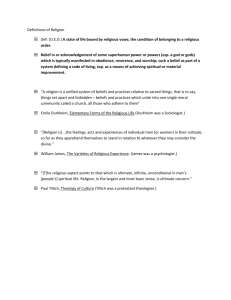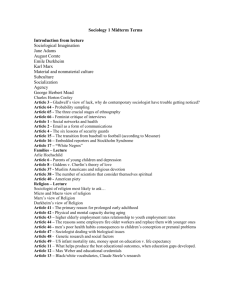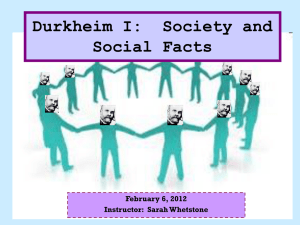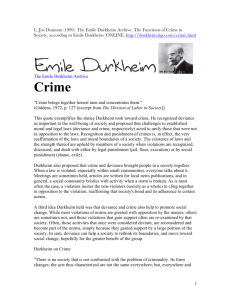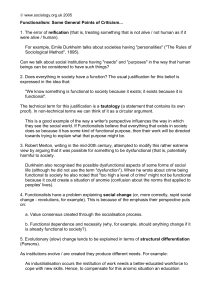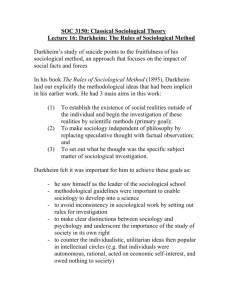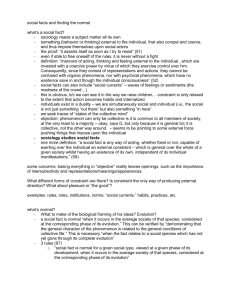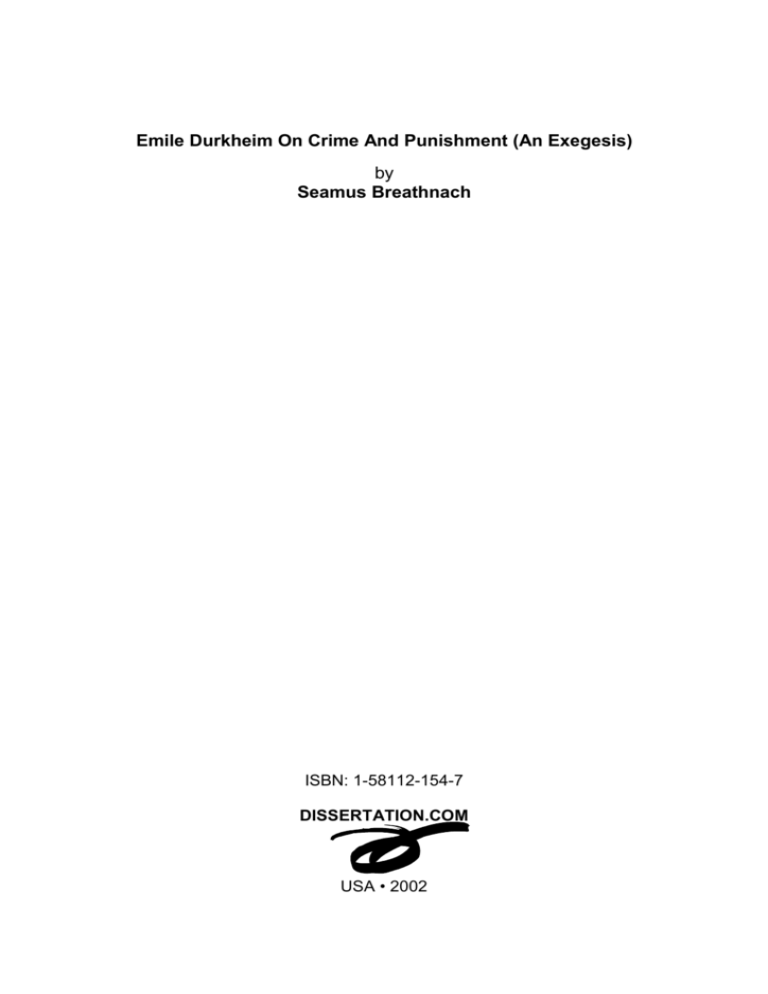
Emile Durkheim On Crime And Punishment (An Exegesis)
by
Seamus Breathnach
ISBN: 1-58112-154-7
DISSERTATION.COM
USA • 2002
Emile Durkheim On Crime And Punishment (An Exegesis)
Copyright © 2002 Seamus Breathnach
All rights reserved.
Dissertation.com
USA • 2002
ISBN: 1-58112-154-7
www.Dissertation.com/library/1121547a.htm
Til minde om Jette
iii
iv
EMILE DURKHEIM
ON CRIME AND PUNISHMENT
(An Exegesis)
BY
SEAMUS BREATHNACH
Table of Contents
Page
Introduction
1
Chapter 1: Criminology and Philosophy
3
Chapter 2: Criminal and Penal Statics
A. Criminal Statics or Crime Defined
B. Penal Statics or Punishment Defined
C. Crime and Punishment
16
26
32
Chapter 3: Criminal and Penal Dynamics
A. Social Dynamics
B. Criminal Dynamics
C. Penal Dynamics
42
56
67
Chapter 4: Crime and Punishment and the State
A. The State
B. Crime and the State
C. Punishment and the State
76
92
98
Chapter 5: The Moral, the Methodological, and the Normal
A. Crime and Morality
B. Methodology
C. Normal Crime
105
113
124
Chapter 6: Notes Towards a Critical Appreciation
Appendix A
References
Select Bibliography (updated)
133
139
143
150
Introduction
By their very nature theories of crime and punishment presuppose the more
primary theoretical formulations both of evolution and society, the one answering
the theoretical time requirement, the other the spatial requirement, and each
symbiotically related to the other in an integral theory of social evolution. Into
such an overall perspective sink Durkheim's theories of crime and punishment.
It is the intention of this essay to explicate these theories without, it is
hoped, paying too much attention to extra- criminological or penological concerns
at their expense. In his theory of evolution, for example, Durkheim felt the
necessity to differentiate himself, from Comte and Spencer ; in his social theory
from theorists like Rousseau, J. Stuart Mill, Hobbes, and Machievelli ; in his theory
of crime from Lombroso, Tarde, Garofalo and the Italian School ; and in his theory
of punishment (as in his 'theory' of the State) from Kant and the utilitarians. In
anthropology, philosophy, religion, political economy, morality and pedagogy
similar differentiations are made. There is, therefore, in a work of this modest
nature, an obvious need to choose not just what is pertinent to Durkheim's theories
of crime and punishment, but, also, what is important.
Since the aim of the essay is an expositional account of these theories, the
more popular interest in 'anomy' and 'suicide' are not formally dealt with. Because
of this overriding perspective and the lack of space available, criticism has
practically been reduced to a hurried sixth chapter. This latter constraint has also
prohibited recourse to original French texts.
Consequently, there is a total reliance on popular translations of Durkheim's
major works - a reliance which, if we are to accept the advice of the erudite, must
necessarily cast some doubt on the interpretation which these pages purport to
ascribe to Durkheim's theories of crime and punishment. Steven Lukes has found
serious fault with these translations, particularly the two major texts upon which
this essay has heavily relied, viz. 'The Division of Labour' and 'The Rules.' In
view of such limitations it is only fair to warn the reader that Durkheim's own
words - even in translation - have been faithfully, if not always wisely, preferred.
-1-
The following abbreviations should be familiarised by the reader , lest their
repeated appearance irritate him unduly. I am not at all convinced that the use of
these abbreviations benefits either the reader or the writer one whit - but it seemed
like a good idea at the time.
Abbreviations Used
DOL = The Division of Labour in Society, trans. by G. Simpson, 1933
ROSM = The Rules of The Sociological Method, trans. by S.A. Solovay and
J.H. Mueller, 1938
S= Suicide: A Study in Sociology, trans. by J.A. Spaulding and G.Simpson,
1975
TLOPE = Two Laws of Penal Evolution, trans. by T. Anthony Jones and
Andrew T. Scull, Economy and Society, v. 2, no. 3, Aug., 1973
JS = The introduction to TLOPE by Jones and Scull
EFRL = The Elementary Forms of the Religious Life, trans. by J.W.
Swain, 1976
EAS = Education and Sociology, trans. by S.D. Fox, 1956
SAP = Sociology and Philosophy, trans. by D. F. Pocock, 1933
ME = Moral Education, trans. by E.K. Wilson and H. Schnurer, 1961
PECM = Professional Ethics and Civic Morals, trans. by C. Brookfield,
1957
SL= Steven Lukes: ‘Emile Durkheim: His Life and Work, A Historical and Critical
Study’, 1973.
-2-
Chapter 1
CRIMINOLOGY AND PHILOSOPHY
It is convenient for the purposes of this part of the essay to treat Durkheim as
(i) a rationalist, (ii) a conceptualist, and (iii) a realist philosopher. As a rationalist
we attempt to locate his status within a historical perspective; as a conceptualist we
shall attempt to illustrate his approach to the theory of crime and punishment; and
as a realist we shall attempt to describe his contribution to the theory of universals.
1.I Durkheim as Rationalist
Descartes, whom Durkheim quotes in support of his scientific sociology
(though not to any great effect), is generally regarded as the father of modern
rationalism. Philosophers like Malebranche, Spinoza and Leibniz can be seen to
trace their views back to the famous Cartesian 'cognito' and the dualism between
mind and matter which, as we shall see, Durkheim tried - methodologically - to
bring together. Generally speaking, however, rationalism finds its truest expression
in Kant, who completed the Cartesian revolution and upon whose thought theorists
like Fichte, Schelling and Hegel have mounted their 'weltanschauungen'.
Even if we define 'rationalism' in its narrow sense as the use of reason to
dispel irrational religious beliefs, Kant’s 'Pure Theory', and Durkheim's 'Elementary
Forms', have at least the death of God in common - and, of course, the passage from a
a theocentric world to an anthropocentric or philocentric one (in the case of Kant),
and to a sociocentric one (in the case of Durkheim). Having attacked the
foundations upon which the existence of a Thomistic/Aristotelian God was based,
Kant was forced to find a new foundation for the absoluteness of moral values. This
he grounded, not in the will of the Divine, but as Masterson points out, 'in the a
priori forms of man’s own understanding and the autonomy of man's pure practical
reason'. (1) God is replaced by the transcendental dimensions of the human spirit
itself, and in order to regulate the practical affairs of men the moral imperative or
categorical imperative is introduced. For Durkheim 'the clan' or 'society' is God:
-3-
"In the world of experience 1 know of only one being that possesses a richer
and more complex moral reality than our own, and that is the collective
being. I am mistaken; there is another being which could play the same part,
and that is the Divinity. Between God and society lies the choice ... I can
only add that I myself am quite indifferent to this choice, since I see in the
Divinity only society transfigured and symbolically expressed." (2)
This distinction between God and society is of primary importance, not just
in locating Durkheim in the history of philosophy, but in understanding his whole
theoretical outline, the relationship between the individual and the group, the
notion of the sacred, his interpretation of history as moving from a religious to a
human type of society and the parallel movements of law and morality, his secular
morality, his methodology, and his theory of punishment and expiation. For both
Kant and Durkheim God is the master-concept - or in Kelsen's terms, the
Grundnorm - which any epistemological thesis must embrace. Consequently,
Durkheim writes:
"Kant postulated God, since without this hypothesis morality is
unintelligible. We postulate a society specifically distinct from individuals ,since otherwise morality has no object and duty no roots." (3)
From our point of view it is sufficient to note how Durkheim's sociology
dealt with the cult of the individual arising out of the Cartesian revolution and, for
that matter, the Christian ethic itself. This emphasis on the individual rather than
the group has had important consequences for sociology and criminology. In
sociology it has found echoes in Weber and defenders of western individualism
like Popper (4) (against the real or imaginary totalitarianism of Plato’s universals,
Hegel’s idealism, and Marx's communism). In criminology it can be found in early
Matza, (5) Becker, (6) and Bottoms and McClean. (7) It must be noted, therefore,
that Durkheim's whole outlook, his account of the social fact, his 'conscience
collective', his theory of history, society, knowledge, religion, crime and
punishment - all stand in opposition to the whole tenor of individualist (though
not empiricist or positivist) philosophy for the past two centuries.
To constitute such an opposition Durkheim simply must distinguish himself
from Kant. And this he does, not in one sphere, but in all spheres, especially
in the relevant areas of punishment, of morality, and of epistemology. In the
-4-
case of punishment, for example, we can see how Durkheim classically disposes of
individualistic philosophy. First of all, he calls on Kant to support the existence
of abstractions in order to put the individualist utilitarians to flight; but then, by
giving that abstraction the vibrant organic life of his 'conscience collective', he
distinguishes his sociology from Kant’s philosophy:
"If we reprove acts which lack humanity, it is because they offend the
sentiments of sympathy which we have for man in general, and these
sentiments are disinterested precisely because they have a general object.
This is the great difference, which separates the moral individualism of Kant
from that of the utilitarians. Both, in a sense, make the development of the
individual the object of moral conduct. But for the latter the individual in
question is the tangible, empirical individual, as realized in each particular
conscience; for Kant, on the other hand, it is like human personality, it is
humanity in general, in abstraction from the concrete and diverse forms
under which it presents itself to the observer." (8)
Further, Durkheim claims that the distance between ‘man in general’ and
'concrete man' equals the distance between man and his concept of God. Since,
however, God is society, the theory of punishment is to be found in history. Just as
for Feuerbach ‘all theology is anthropology’ so, too, for Durkheim, punishment is
better understood when anthropologically explained.
1.2. Durkheim as Conceptualist
In the ‘Division of Labour’ Durkheim not only classified social solidarities
according to the repressive and restitutive sanctions proper to their respective
juridical rules, but he further developed this classification (9) in a useful way for
understanding criminal statistics. In the 'laws' he makes the distinction between
religious and human crimes, and in the ‘Rules’ he classifies societies by type . To
understand the justification for such classifications it is necessary to devote some
time trying to appreciate the status which the notions of categorization and
classification enjoy in Durkheim's sociology. (10)
Let us begin by posing the problem posed by Bertrand Russell in his
'Introduction to Philosophy': 'How do I know this table'? Of necessity Russell
proceeded to disentangle the subjective elements in his knowledge from the
-5-
objective elements, the intellectual from the sensual, that which was apriori from
that which appeared aposteriori. And whether the table exists, by reason of a
chemico-physical relationship (Empiricism: Locke et al.) or on an inherent
consciousness within the observer and, when the observer’s eyes are closed,
on God’s consciousness (Idealism: Berkeley), depended the answer to the
epistemological question, 'How do I know this table?' Between these two classical
schools of thought came two others prior to Durkheim, that of Hume and that of
Kant, and it is these latter two whom Durkheim challenges.
David Hume took the empiricist line and propounded a theory whereby
the origin of the categories accrued to our sensual experiences. Moreover, he
reformulated the principle of causality in terms of a psychological habit of
expectation arising from repetitive and associated ideas, elsewhere known as the
‘billiard-ball’ theory of causality. From such sense data it is possible to know this
table; and, by the same argument, it is not possible to know a transcendent God or
first cause. Kant, however, held that no amount of sense-data could give rise to the
concept of causality without there being something prior in the mind, something
subjectively innate, which made knowledge possible.
All knowledge comes initially from sense data, but it is only made knowable
by inner modalities, categories, which must be assumed. Therefore while there is no
rational proof of the existence of God, morality demands His or a similar
‘categorical imperative’. Moreover, I know this table, not just by feeling it, seeing
it, etc. - i. e. by sense data, but also because , aprioristically, I conceive of the
abstraction wood and tableness into which my sense data of this table can be
meaningfully fitted.
Durkheim, who felt that one of the great advantages of sociology lay in its
ability to solve certain philosophical questions, sought to resolve these 'two
conceptions that have been pitted against each other for centuries.' (11)
"At the root of our judgments, there exists a certain number of essential ideas
which dominate the whole of our intellectual life; they are those which
philosophers since Aristotle have called the categories of understanding:
notions of time, space, genus, number, cause, matter, personality, etc. They
correspond to the most universal properties of things. They are like solid
-6-
frames enclosing thought, and thought does not appear to be able to break
out of them without destroying itself, as we do not seem to find it possible
to think of objects, which are not found in time, or space, which are not
numerable, etc." (12)
In rejecting Kant, because it is no explanation to say that the categories
are inherent in the nature of the human intellect, Durkheim sought to explain
the dilemma in terms of social structure, social morphology and ‘concepts’
which are ‘collective representations’. Durkheim succeeds and compliments
Kantian thought rather than demolishing it. Kant admirably poses the present
issue in so far as it tempts a Durkheimian solution. Kant, for example, assumes
a concept called 'innateness' and , that this concept is polarized from experience.
But this polarity needs a middle term both to conjoin the categories and to explain
them. This is what Durkheim's concept of sociology does.
Innateness, for Durkheim, 'is a simple way of stating the impossibility of
reducing rational knowledge to empirical data.' (13) But if 'the categories are, as
we believe they are, essentially collective representations, before all else, they
should show the mental states of the group; they should depend upon the way in
which this is founded and organised, upon its morphology, upon its religious,
moral and economic institutions, etc.' (14) To understand the import of what
Durkheim is saying we need to understand the nature of man in society, the
interplay between the individual and the social. We have already seen that society
is 'God' and that, consequently, 'it is a reality sui generis.' We now need to
know that the individual and the social dimensions of our nature have as their
consequence in the practical order 'the irreducibility of a moral ideal to a
utilitarian motive, and in the order of thought, the irreducibility of reason to
individual experience. In so far as he belongs to society, the individual transcends
himself, both when he thinks and when he acts.' (15)
It is because the categories are such pre-eminent concepts that they have
such an important part to play in our knowledge. In fact, their function is 'to
dominate and envelop all the other concepts: they are permanent moulds for the
mental life'. (16) But this is not to say that the categories do not change; they do. It
was the fault of Hume and Kant to think that they remained fixed. If we understand
-7-
their origin in religious society, and understand the social nature of all religion, we
can see , not only how they become modeled on the social forms , but also how they
change as society changes. Moreover, we can begin to understand how Durkheim
can claim that science and religion share the same social source, how classification
becomes the basis of all science, and how concepts like causality and logical forms
are initially nourished into our consciousness by the cumulative rhythms of social
life. Inversely, those whom we have not successfully socialized into firmly grasping
these more basic categories we invariably call insane.
The idea of 'collective representations' is best understood, as Nisbet
understood it, i.e. as the phrase for what most of us call more commonly 'traditions,
codes, and themes of culture.' (17) By our interplay with the socialising forces of
our society we come to understand the basic 'collective representations', or
categories, or concepts, which our society has evolved up to the time of our
socialisation. But because these collective representations change, so do our social
and scientific concepts. What is important for us to note here is (a) the manner in
which logic becomes superceded by socio-logic, and (b) the place classification
plays in this new form of logic.
(a) We have already stated the fact that the death of God marked the passage
from a theocentric world to a philocentric one. This coincides with the relegation in
Western Europe of theology to the rise of the social sciences, notably, psychology,
anthropology and sociology. Giddens has adequately described this Comtean idea:
"These processes of development, according to Comte, are primarily
governed by a simple principle: those disciplines relating to phenomena
furthest from man's own involvement and control develop first, and the
history of science as a whole is one of a progressive movement inwards
towards the study of man himself. The mechanism of scientific development
provides the key to the logical relations between the sciences. The earliest
sciences to come into being are those, which deal with facts of the greatest
generality; thus each field of study in the hierarchy of the sciences is
predicated upon those, which lie below it, although its own concepts and
generalizations are irreducible. Sociology, which concerns itself with human
social conduct, presupposes the laws of biology, which apply to all
organisms, while the latter in turn presume the laws of chemistry, etc."(18)
-8-
Since logical thought is made up of concepts, the part played by society in
the genesis of logical thought must be sought in the manner society formulates
concepts. Concepts, therefore, are the central piece in the mosaic of Durkheim's
thought. They must first of all, to be defined, be distinguished from sensual
representations, whether these come in the form of sensations, perceptions or
images. Whereas sensations and perceptions change in a perpetual flux, concepts
remain 'outside of time and change': they resist change, and 'in so far as they are
what they ought to be, (they) are immutable'. (19) As with language, concepts,
when they do change, change slowly. It is not simply because it is their nature to
change that they do change, but rather because we change their apparent
imperfections. The virtue of concepts lies in the fact that they are communicable.
This is so, because, unlike sensations, which are grounded in the private
personality and are therefore incommunicable, concepts are not private but are held
in common. Being common, their origin is communal. Language translates the
system of concepts because its diverse elements represent the facts of society’s
experience - but the ideas, which correspond to these elements are collective
representations. (20) And if concepts express categories and classes rather than
particular objects it is because society qua society is less interested in the unique
and variable characteristics of things. This is how we distinguish between the
general idea and the concept. Moreover, because we generalise from the particular,
the individual can disengage himself from group knowledge, and there being
nothing in the general but the particular, knowledge would not accumulate. What
characterises logical thought and concepts, on the other hand, is their
impersonality.
By their impersonality, stability and communicability, concepts are known
to be social. And if we look to their social origin we will find, according to
Durkheim, that the category of ‘class’ is no more than the realisation of the human
group, the category of ‘time’ is known through the rhythm of social life, the
category of 'space', is furnished by the territory occupied by society, and the
concept of 'force' (21) is known to us from the collective force. Finally, the concept
of 'totality' corresponds to the concept of society as a whole. In genera , therefore,
'logical life has its first source in society.'
(b) Because the first logical categories were social in origin, it followed that,
for Durkheim, 'the first classes of things were classes of men, into which things were
-9-
integrated.' Moreover, being grouped, men assimilated the classified image of the
group and, consequently, classified other things in the likeness of the group.
At base classification is a system whereby certain like elements are arranged
into a hierarchy. But this hierarchy could not be learned from the spectacle of
physical nature nor the mechanism of mental associations. (22) It is exclusively a
social derivation, because it is only society that can create superiors, inferiors and
equals. And men would never have thought of arranging their knowledge in terms
of subordination and co-ordination had they not known beforehand what a
hierarchy was.
To appreciate fully how classification is bound up with the categories we
must first understand exactly what the 'concept' meant in Durkheimian
epistemology. Thereafter, we can appreciate what precisely we do when we
conceive of something. 'Conceiving something', said Durkheim, 'is both learning
its essential elements better and also locating it in its place ; for each civilization
has its organized system of concepts which characterizes it.' (2 3)
By sociologising the concept Durkheim perceives the unity of method
between religion and science. Religion, no less than science, attempts to connect
things with each other, to establish internal relations between them, to classify
them and to systematise them. (24) To the question, therefore, 'How do I know
this table?' the Durkheimian answer is: I know it because I have become socially
predisposed, first of all to conceive of the representations which the word ‘table’
conjures up and means, and, secondly, to classify it as between wooden domestic
objects that have relative social signification. If, on the other hand, I had never been
socialised, then I could neither understand the question, its purpose, or the meaning
of the words comprising it. It is hardly likely that this discourse would ensue were it
not for the fact, realised or not, that all these things of which we speak are given to
us by virtue of collective representations. The potential for linguistic philosophy
as a derivative of Durkheim's sociology of knowledge has already been exploited by
by Mauss, Chomsky and Levi-Strauss. Ernest Gellner, in his 'The Devil in Modern
Philosophy' noted that it was Durkheim's sociology that is also at 'the core of
Wittgenstein’s mature philosophy.'(25)
- 10 -
1. 3. Durkheim as Realist
The ‘theory of universals’ presents one of the oldest philosophic questions
in Western philosophy. So much so, in fact, that it is true to say that any
philosophic problem, if pursued rigorously enough, will sooner or later be forced
to confront at least some of its ramifications. Needless to mention, it is treated here
artificially, i.e. we constrain its vital philosophic issues in order to bring them into
contact with Durkheim's overview and thereby, it is hoped, understand more
favorably his theories of crime and punishment. But how should we best illustrate
our particular concern?
With Russell’s epistemological question, 'How do I know this table'? we
tried to bring out the issue between empiricism and rationalism (in a very limited
way, no doubt). In asserting the a priori conditions of knowledge Kant answered
this question by postulating reason’s power to abstract and to understand the
concept 'tableness.' Durkheim, on the other hand, dissatisfied with these
inexplicable a priori postulates and abstractions, answered it in terms of his
understanding of concepts, language, and the social classification of knowledge.
In briefly delineating his definition of concepts we mentioned that it had to be
distinguished from generalizations. Durkheim's concepts, we said, are social, they
are collective representations, and are not simply disengageable by the individual
as generalizations are. It is to this aspect of his concepts that we must now return.
The antithesis between empirical and rational knowledge has another
related dimension. If I ask 'How do I know this man'? I can answer that, in seeing
him, hearing him, etc., I can form an image of him. If, however, I ask, 'How do I
know man in general?' Or humanity, courage, virtue, etc., I cannot answer that
I have seen them, heard them, etc. So, how do I know them? And what are the
conditions of their existence? This is the a priori argument again; but for our
purposes we can distinguish between our knowledge of ‘this man’ and ‘humanity’
by similarly distinguishing between the image and the idea, imagining and
thinking, between the sensible representation of this man and the idea of man in
general. It will also be seen that objects, which present themselves to our senses,
like images, are singular (this man), whereas ideas have nothing of the particular in
them. The idea 'man' has nothing of Peter, Paul or Bill in it; it has been, we say,
abstracted from a particular man, it is universal. But which is real, 'this man' or 'man
- 11 -
in genera1', the particular or the universal? If we bear in mind that what Plato called
'forms' is what the philosophers generally refer to as 'ideas', and is, equally, what
Durkheim denotes when he talks about ‘concepts' or collective representations,
and if we also bear in mind that the interplay between the 'individual' and the
'social' parallels the problem of the relation between the particular and the
universal, we shall all the better appreciate how Durkheim sociologised a very old
philosophic problem.
When Plato, who first put forward the theory of universals, asks what is man,
beauty, courage, etc., he does not mean that the answer should contain a list of
examples of things that we regard as manful, beautiful or courageous. Using
Socrates as a spokesman, Plato seeks a definition of man, beauty and courage in
terms of those qualities 'which would then serve to guide us in deciding what we
ought to say about particular cases.' (26)
Definition plays a similar role in Durkheim's methodology. If, consequently,
we wish to define crime, it is futile to list those acts, which constitute an infraction.
Because they are so multifarious they will not permit us to recognize the essential
characteristics of crime, which alone will guide us in deciding what we ought to say
about particular cases. Similarly, if we attempt to define social types, we should
seek out the decisive or crucial facts, which, by themselves - and independently of
their number - have scientific value and interest. (27) 'A satisfactory method must,
above all, aim at facilitating scientific work by substituting a limited number of
types for the indefinite multiplicity of individuals.' (28) Moreover, this method
will only be 'truly useful if it permits us to classify characteristics other than those
serving as its basis and if it procures for us a framework for the facts to come.' (29)
For Plato, it was the forms and not the particulars that was the subject matter
of philosophical definition. Particulars were merely dependent on the forms, but
the forms were not dependent on the particulars. The forms were immutable, the
particulars were in constant flux; the forms were known only to the intellect,
particulars were known to the senses. The forms constituted the reality of things.
Consequently, philosophers who approximate this viewpoint, like Spinoza, Hegel
and Durkheim, are in this sense realist. But Durkheim's thought is not quite that of
Plato’s; Plato’s logic is somehow superceded by Durkheim's socio-logic. How has
this become possible, and in what particulars? Despite the obvious similarities
- 12 -
between Platonism and Durkheimian thought, Platonism alone would not justify
Durkheim equating definition with classification, or his emphasis on genus and
species - concerning which Aron rightly noted:
"He has a tendency to regard the distinction between genera and species as
fundamental, as inscribed in reality itself. Thus, if there are several causes of
suicide, it is because there are several types of suicide. The same is true of
crime." (30)
This observation of Aron’s corresponds precisely with the main question
concerning the existence of 'universals’ as posed by Porphyry. If , according to
Plato’s dictum, there are no straight lines in nature, then where are they?
'Do genera and species exist in nature, or do they consist in mere products
of the intellect?' (31) If we set aside Aristotle’s distinction between primary and
secondary substance, and take his secondary substance as given, we find the
Durkheimian solution in logical terms, because for Aristotle the definition of
secondary substances is carried out in relation to a system of classification
'according to which things are divided into various kinds (genera), which in turn
are divided into various sub-kinds (species), these being distinguished from each
other by certain characteristic properties (differentia). (32) Further, for Aristotle as
for Durkheim, while 'genus' and 'species' may be relative terms there is a hierarchy
of classes, which, for any given subject matter, has a one-to-one correct correspondence in nature. We have already mentioned how Durkheim located the concept of
hierarchy in the social, we can now see that social types must similarly hve their
genus and species. (Is this method peculiar to the social or the natural sciences?)
In opposition to the Platonic realists, the nominalists (comprising some
sophists, sceptics and, particularly, William of Occam, Hobbes, Locke, Berkeley,
Hume and Spencer – and, these days, Foucault) believed that those things, which
Plato called universal or real, had no existence except as ideas or names (hence
nominalism ). In other words they believed that there was nothing in reality or
nature to which these forms, ideas, or universals correspond. By reasoning thus, this
school had been accused of negating the possibility of intellectual knowledge and
reducing science to a figment of the mind. (33)
There was, however, a third school which, like Durkheim, sought to solve
- 13 -
the realist/nominalist antinomy; this was known as the 'moderate realism' of St.
Thomas. Following the scholastic tradition the 'angelic doctor', who had improved
upon Aristotle’s 'corrections of Plato', thought that the problem was resolved thus:
Thomas first of all distinguished between the thing itself and the condition in
which it is presented to the mind. He thought, consequently, that in reality a thing
is individual, but by our ideas we apprehend it as a universal. In other words 'That
which our ideas present to us as a universal does not exist outside the mind as a
universal' - but 'exists outside the mind individuated'. (34) The mediating logic of
Thomism has precisely the same result as the mediating sociology of Durkheim's
‘social species’.
"This concept of the social species has the very great advantage of
furnishing us a middle ground between the two opposite conceptions of
collective life which have for a long time divided the ranks of scholars: the
nominalism of historians, and the extreme realism of philosophers." (35)
Further:
"But one escapes from this alternative once one has recognized that,
between the confused multitude of historic societies and the single, but
ideal concept of humanity, there are intermediaries, namely, social species.
In the latter are united both the unity that all truly scientific research
demands and the diversity that is given in the facts, since the species is the
same for all the individual units that make it up, and since, (36) on the other
hand, the species differ among themselves."
Durkheim's initial similarity with Platonism may indeed merit him the name
of realist. (37) Even when he uses the word 'idea', says Peristiany, '…he wishes to
denote that he is using this term in its Platonic sense.' (38) But he also
approximates Aristotle (and since St.Thomas assimilated so much of
Aristotelianism) he can also be seen to approximate some of the teachings of the
Catholic Church. As already stated by using Aristotle`s concept of substance,
by which the categories, genus and species, and classification, were possible in
nature, Durkheim was able intellectually to exclude an appeal to a divine creator.
Durkheim, it should be said, is not interested in putting forward a metaphysic.
Apart, therefore, from the very central piece of the scholastic ensemble -- 'God' -- 14 -
the criticisms which aimed at amplifying his debt to the medieval school
would otherwise seem to be well founded. Catlin has noted his motives in
this respect:
"Durkheim (himself of rabbinical parentage) wishes to provide French
anticlerics with as good a moral authority as that upheld by the Catholic
Church, with its appeal to a scholastic rationalism based on revelation." (39)
1.4. Conclusion
We have variously described Durkheim as rationalist, conceptualist and
realist because we feel that he defies any rigid designation peculiar to philosophic
schools proper. Peristiany, moreover , has described his philosophic work with
equal justification as 'Essays in Sociological Spiritualism', meaning that Durkheim
believed 'that the properties (and interests) of the whole and those of the
individuals who compose this whole are not homogeneous.' (40) Durkheim
considered himself to be a rationalist. He even claimed that the only designation
he could accept was that of ‘rationalist’. Indeed, his principal objective was aimed
at extending 'scientific rationalism to human behaviour.' (41)
Further, he believed that behaviour of the past, when analyzed, could be
be 'reduced to relationships of cause and effect.' (42) But qua realist he felt that
'only the universal is rational' (43) and that 'there is nothing in reality that one is
justified in considering as fundamentally beyond the scope of human reason.' (44)
But the rationalist principle, for Durkheim, while necessary for science, does not
imply that science can in fact exhaust the real. It only denies that one has the right
to look at any part of reality or any category of facts as invincibly irreducible to
scientific thought. (45)
- 15 -
Chapter 2
CRIMINAL AND PENAL STATICS
2. A. Criminal Statics or Crime Defined
2. A.1. The Necessary and Sufficient Conditions for the Science of Durkheimian
Criminology
For a set of studies to be called a science Durkheim thought it ‘necessary
and sufficient’ that they present certain characteristics. These characteristics are
threefold:
(a) 'They must deal with verified, selected, observed facts.' (2) The science in
question, whether it applies to educational, religious, economic, or criminal
phenomena, is defined by its object. 'It assumes, consequently, that this
object exists, that one can point it out, in some way, (and) mark out the place
it occupies in the whole of reality.' (3)
(b) These facts must have within themselves a sufficient homogeneity to be
able to be classed in the same category. 'If they were irreducible to one
another, there would be, not one science, but as many different sciences as
distinct types of facts to study.' (4)
(c) Finally, science studies these facts 'to know them, and only to know
them, in an absolutely disinterested fashion'. (5) Durkheim purposely used
this rather general and vague word, 'know', because he felt that it was of
little consequence whether the scientist attempts to establish types rather
than to discover laws, that he limits himself to describing or that he seeks to
explain’ phenomena. (6) Even though he may be quite conscious of the
utility of his discoveries, he is, nevertheless, disinterested in their practical
consequences. (7) The scientist 'says what is; he establishes what things are,
and he stops there.' Being unconcerned whether his discoveries 'will be
agreeable or disconcerting', the sociologist’s role 'is to express reality, not
to judge it.' (9)
- 16 -
In accordance with this procedure the 'initial definition', which characterised
all of Durkheim's empirical work, assumes a singular importance. Apart from directing us to entertain a healthy Cartesian doubt and, thereby, eradicate all preconceptions he insisted in the 'Rules' that 'the subject matter of every sociological study
should comprise a group of phenomena defined in advance by certain common
external characteristics, and all phenomena so defined should be included within
this group'. (10) The definition, therefore, must characterise the phenomena by
'elements essential to their nature', for these 'are our only clue to reality', and,
consequently,'must be given complete authority in our selection of facts'. (11)
In the case of the science of criminology, then:
"We note the existence of certain acts, all presenting the external
characteristic that they evoke from society the particular reaction called
punishment. We constitute them as a separate group to which we give a
common label; we call every punished act a crime, and crime thus defined
becomes the object of a special science, criminology." (12)
Being formulated at the beginning of criminological studies, however, the
definition of social phenomena 'cannot possibly aim at a statement concerning the
essence of reality.' (13) On the contrary, its sole function 'is to establish contact
with things' by grasping at reality in the only terms in which it can be understood
- its external qualities. From the outset, therefore, when Durkheim defines crime
in terms of punishment or sanctions, we are to take it that he is defining the multiforms of criminality in a preliminary way by the 'elements essential to their nature',
one of which is punishment. If punishment is not the essence of crime, it nevetheless constitutes such a symptom thereof that 'in order to understand crime ,
we must begin with punishment.' (14) Why? Because by beginning in this way
we 'establish a criterion for those acts that we call crime,' and the virtue in this is
that 'the pattern of such a classification does not depend on him (the definer)
or on the case of his individual mind, but on the nature of things.' (15)
Though this claim begs further questions Durkheim nevertheless
claimed that the criteria according to which crimes are placed in a particular
category, 'can be recognised by everyone' and the concepts thus formed do not
always or even generally tally with that of the layman. (16) As an operational
- 17 -
device, this 'initial definition', then, serves to circumscribe 'the field of each
problem, whether general or particular', and in that way the sociologist 'from
the first, is grounded in reality'. (17)
Before going on to examine Durkheim's definition of crime and its
derivative, punishment, as dealt with in the Division of Labour, it is instructive
to describe briefly the context in which they arise and, further, to ask how crime
is sociologically conceived.
2.A. 2. The Definitional context of the Division of Labour
Acknowledging his debt to Comte, Durkheim claimed that the division of
labour had to be seen in its totality, i.e. not just as an economic phenomenon but
one which linked all communal workers and classes to their predecessors and
successors.
'It is', said Comte, 'the continuous repartition of different human
endeavours which especially constitutes social solidarity and which becomes the
elementary cause of the extension and growing complication of the social organism.' (18) If this hypothesis were proved, Durkheim felt that it would be a condition
of the existence of all societies, their cohesion would be assured, and it would
'determine the essential traits of their constitution.' Moreover, if such was really the
function of the division of labour, its moral character could be implied, 'for the
need of order, harmony, and social solidarity is generally considered moral.' (19)
Thus far, then , Durkheim held that social solidarity was a completely moral
phenomenon, which could be measured by law, its external index and visible
symbol. Accordingly , 'the general life of society cannot extend its sway
without juridical life extending its sway at the same time and in direct relation'.
(20) Juridical rules, repressive and restitutive, therefore, between them divide up
the social universe and provide an index of societies' interactions. Also, to measure
the part, which the division of labour plays in any given society at any given time,
it is only necessary to compare the number of juridical rules, which express it (i.e.
those with a restitutive sanction) with the total volume of law. (21)
We can classify juridical rules according to the different sanctions attached
to them, because every legal precept can be defined as a rule of sanctioned conduct.
As society changes, its precepts change with the gravity society accords to them.
- 18 -
Correspondingly, the sanctions promoting these precepts also change. Whereas
repressive sanctions call forth a spontaneous punishment, restitutive sanctions
attempt to return things as they were. Social evolution moves from a society
characterised by repressive sanctions toward one characterised by restitutive
sanctions and the division of labour.
Moreover, if there are types of social solidarity which custom alone
manifests, Durkheim informs us that it is unnecessary to consider them, because,
although they are diffuse, they are of secondary importance. Law more positively
produces primary relations, which are sufficient for the purposes of classifying
social solidarity, whereas the relations accruing to customary practices 'lack
importance and continuity'.
2.A.3. What Crime Essentially Is
Since the essential properties of a thing are those which are observed
universally, if we wish to know what crime essentially is, then 'we must extract '
those elements of crimes that are similar in all criminological varieties and in the
different social systems : 'none must be neglected'. (22) Durkheim insisted on this
thoroughness, it is here suggested, because methodologically his sociology (rather
than his criminology) rests upon a very tentative classification of all societies into
'species and types'. Such social types centralise his concept of science, by both the
manipulative use of the 'averge', and his primary need for definition. The biologist,
he claimed, would have given vital phenomena a very inexact definition if,
disdaining to observe monocellular organisms, he solely contemplated organisms
of a higher type. Such inattention would have led him mistakenly to conclude that
life 'essentially consists in organization'. (23) So, too, with the criminologist.
Having said that, however, Durkheim criticises Garafalo who attempted such
a thorough investigation and who tried to formulate his findings into a theory of
'natural crime'. The method he adopted, however, 'of finding this permanent and
pervasive element' was unsatisfactory ; because the enumeration of all acts that
have ever been called crimes, is of itself methodologically futile . (24) In Durkheim`s
estimation 'the only common characteristic of all crimes is that they consist ... in
acts universally disapproved of by members of each society'. (25) From this opinion
he is led to what he regards as an incontestable truth, namely , 'that crime
shocks sentiments, which, for a given social system, are found in all healthy
- 19 -
consciences.' (26)
To define crime, therefore, we must seek out its essential characteristics: for
these are to be found wherever crime occurs, no matter what the social type, be it
high or low. It is instructive if we first give Durkheim's definition of crime, and then
inquire how he came to define it.
A crime is an act, which offends strong and defined states of the collective
conscience. This is so, because the only characteristics common to all crimes
recognised as such are the following:
(a) A crime offends sentiments which are found among all normal
individuals of any given society;
(b) These sentiments are strong;
(c) These sentiments are defined.
2.A.4. Crime Defined
(a) In arriving at this proposition Durkheim, methodologically speaking,
distinguishes himself from (i) Garafalo and (ii) the Marxists, particularly
Quinney.
(i) If - as has already been stated - we set out to enumerate acts
ubiquitously recognised as crimes, and attempt to classify their characteristics, we
would, says Durkheim, wind up with a set of crimes universally recognised, but
which would nevertheless be small and exceptional in number. This type of 'natural'
crime would total the offenses that are contrary to universal sentiments and would
be, on that account, the 'invariable part of the moral sense and that alone'. Such a
method, he held, was faulty on a number of grounds. If, for example, we tried to
collate them with a list of acts universally punished, we would not be satisfied,
because the latter would be excessive whereas the former, being a collection only
common to all societies, would be minimal.
- 20 -

